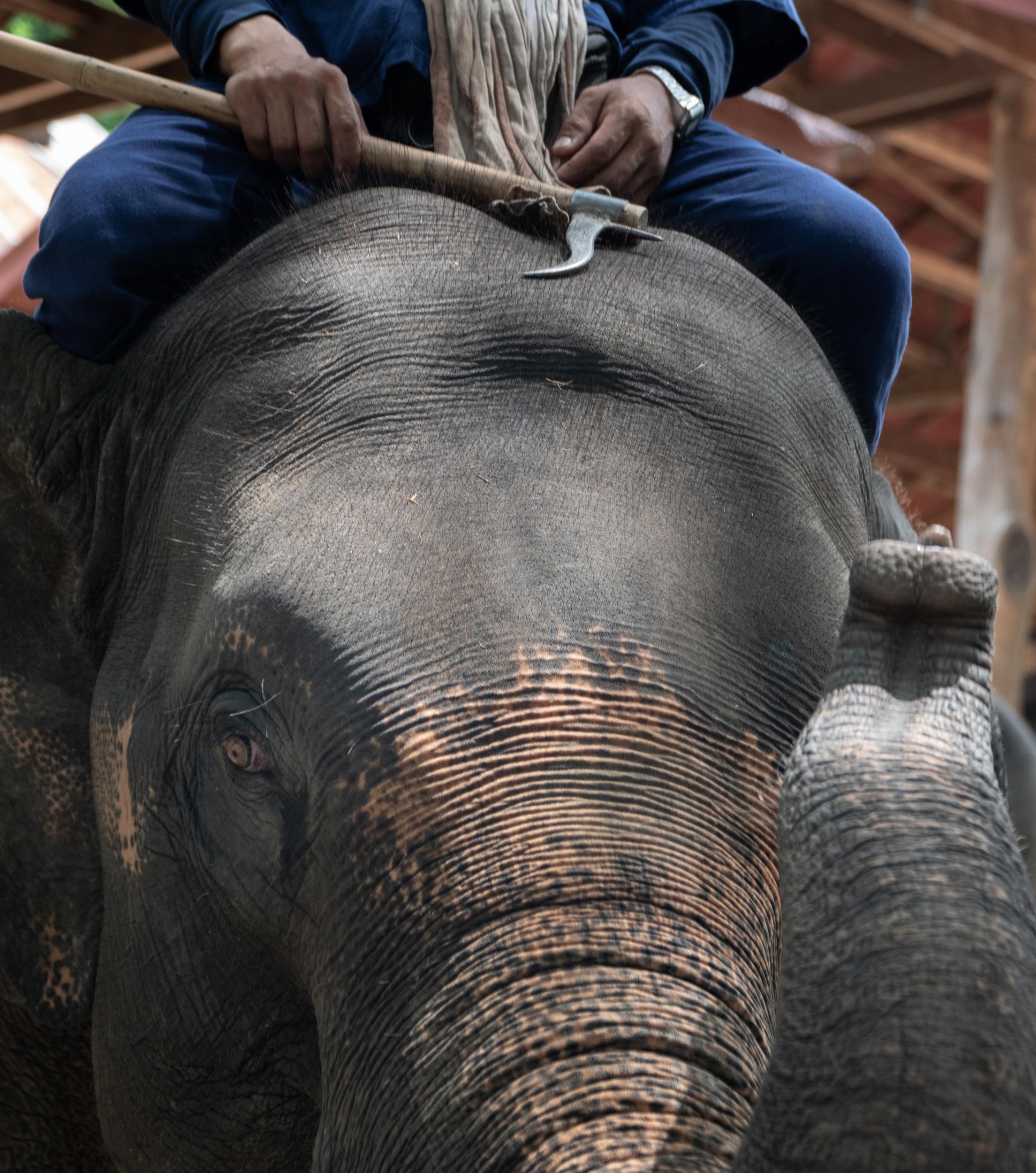Baby elephants hit with metal hooks and forced to do tricks for tourists in ‘nursery from hell’, say investigators
Exclusive: Footage shows animals ‘bred into life of suffering’ swaying in suspected distress
Tourists are funding an Asian elephant camp where baby animals are hit and scraped with sharp metal hooks, chained up and forced by fear of punishment to perform tricks, an investigation has found.
Witnesses branded the centre “the elephant nursery from hell”, describing how they had filmed young elephants being pulled by their delicate ears, being forced to carry people on their backs, and swaying back and forth, a behaviour agreed by animal experts to be a sign of mental distress.
The Maesa Elephant Nursery in northern Thailand attracts tourists from around the world, all wanting to get close to the gentle giants. But critics say that behind the scenes the animals are being controlled by painful hits from metal bullhooks and left “psychologically broken and suffering immensely” from the treatment and training they receive.
They accuse the centre of being a “baby-making factory” where female elephants are often relentlessly “bred”, spending much of their lives in repeated pregnancies.
Even expectant mothers are forced to perform tricks, such as “painting” and kicking a football, three times a day, often while still in chains, according to the investigators from the Moving Animals group, who claimed to have filmed the abuse.
Female elephants are artificially inseminated repeatedly, spending 18-22 months pregnant each time, and their babies are bred into lives of captivity.
The calves are taken away from their mothers when they are two years old, then put into phajaan, a training process known as “the crush”, which is used across Asia to “break a young elephant’s spirit”.

“Under phajaan, elephants are bound with ropes, confined in tight wooden structures, starved, and beaten repeatedly with bullhooks, nails, and hammers until their will is crushed,” National Geographic has reported.
Moving Animals says this process is used to force calves to become money-making performers to entertain tourists who pay to see calves at the nursery before watching older elephants perform “cruel” tricks including:
- painting pictures while their mahout pinches their delicate ears to guide the paintbrush
- throwing sharp darts at balloons
- kicking footballs into goals
- performing an “excruciating” recreation of the now-illegal logging industry, pulling and stacking heavy logs
The UK government is considering banning elephant riding adverts and ticket sales after campaigning by Moving Animals and Save the Asian Elephants.
These innocent babies are at the start of a lifetime of captivity that will feature sharp bullhooks, cruel performances, and severe psychological stress
The camp, which has been running for 43 years, and has more than 80 elephants in captivity, did not respond to requests from The Independent to comment. But its website says elephants cannot be released into the wild as they would be at risk from farmers protecting their crops and from landmines.
It adds that the elephants are used to being chained, which prevent them from straying, and that hooks are used only by mahouts in defence of his own life.
But the footage shows at least one trainer using a bullhook to make elephants comply.
Amy Jones, of Moving Animals, which is running a petition calling for a ban on adverts for tickets to such places, said: “Our investigations across Asia have repeatedly shown elephants face relentless physical and emotional suffering to take part in rides, processions and performances.
“It is heartbreaking to think these innocent babies at Maesa Elephant Nursery are at the start of a lifetime of captivity that will feature sharp bullhooks, cruel performances, and severe psychological stress.”
She accused travel companies of misleading tourists. “To save another generation of baby elephants from a lifetime of misery, Defra [the environment department] must act now and ban British companies from selling tickets to elephant ‘attractions’,” she said.
National Geographic’s witness account went on: “When a baby is about two years old, they say, mahouts tie its mother to a tree and slowly drag the baby away. Once separated, the baby is confined.
“Using a bullhook on its ear, they teach the baby to move: left, right, turn, stop. To teach an elephant to sit, Sala-ngam [one of the elephant trainers] says, ‘we tie up the front legs. One mahout will use a bullhook at the back. The other will pull a rope on the front legs.’”

Join our commenting forum
Join thought-provoking conversations, follow other Independent readers and see their replies
Comments
Bookmark popover
Removed from bookmarks